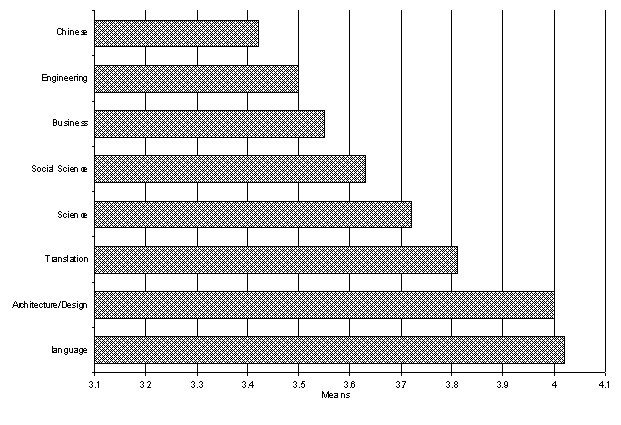
English, however, is the "language of success" and continues to be used at higher levels of administration and business, particularly in written communication (So, 1989). Knowledge of English correlates highly with income, social prestige, and educational level (Fu, 1987; Cheng & Zi, 1987) and, as a result, English has a strong image of marketability among the community. Because of the material benefits the language offers, recent surveys have found a strong abstract motivation to learn English for academic and career purposes (Balla, 1991; Richards, 1993). The economic importance of English is reflected in a colonial education system where English is the de facto medium of instruction for virtually all secondary and tertiary students. But while language planners are increasingly questioning the validity of using a language of "wider use" rather than a national language of limited international currency (Education Commission, 1995), there is a widespread belief among both parents and students that English medium education results in a better standard of English (Tung et al., in press).
However, most secondary teachers are untrained in the language (Education Commission, 1995, p. 26), and students' monolingual lives outside class offer limited opportunities to practice it (Littlewood et al., 1996). As a result, bilingual instruction is prevalent in both secondary and tertiary classrooms, as a means of making material accessible to learners with limited English, despite official prohibitions against what is seen as a pedagogically harmful interlanguage (Lin, 1996). But this predominance of English creates serious learning problems for many students (Yu & Atkinson, 1988), and at least 30% of students have difficulty following their L2 curriculum even when code-switching is employed (Kwo, 1987). In 1994, 21% of 25,300 candidates failed the "Use of English" examination and another 35% obtained only an E, making their future studies conditional upon success in a remedial "language enhancement programme." With 18% of the relevant age-group engaged in tertiary study, it is not surprising that many students often struggle at university. One purpose of this study, therefore, was to determine the extent to which difficulties in English contribute to these problems.
| Institution | n | % | Year of Study | n | % |
|---|---|---|---|---|---|
| Hong Kong University | 99 | 6.1 | 1 | 1050 | 64.9 |
| U of Science & Technology | 263 | 16.2 | 2 | 423 | 26.1 |
| Polytechnic University | 124 | 7.7 | 3 | 146 | 9.0 |
| City University | 453 | 28.0 | Language at secondary school | ||
| Lingnan College | 680 | 42.0 | English | 1222 | 75.5 |
| Chinese | 336 | 21.7 | |||
| Total: | 1619 | 100.0 | missing | 61 | 3.8 |
| Program | n | % | Proficiency | n | % |
| Social science | 334 | 20.6 | A | 26 | 1.6 |
| Business | 447 | 27.6 | B | 56 | 3.5 |
| Translation | 84 | 5.2 | C | 180 | 11.1 |
| Chinese | 114 | 7.0 | D | 566 | 35.0 |
| Science | 153 | 9.4 | E | 695 | 42.9 |
| Engineering | 379 | 23.4 | F | 41 | 2.5 |
| Design/Architecture | 54 | 3.4 | U | 2 | 0.1 |
| Language & Communication | 54 | 3.4 | missing | 53 | 3.3 |
The results were subjected to statistical tests for reliability and significance using SPSS (Statistical Package for the Social Sciences), a powerful statistical program for personal-computers. A series of one-way ANOVA procedures was used to compare groups and identify significant differences between them. Where statistically significant differences between groups was found, a post-hoc analysis of the means was conducted to discover the precise location of these variations. The Scheffe test for the multiple comparison of grouped means was used for this purpose, set at the 0.05 level of confidence. Comparisons at this level indicate that there is a 95% chance that results are due to the differences between populations.
A student can learn enough English through his/her subject without the need to attend English classes (Question 5b)Respondents tended to disagree, with an overall mean of 3.6, and although support for EAP classes weakened slightly with each year of study and with each increase in ability grade, there were few significant differences either by year or proficiency. However, when comparing majors, means for students of different disciplines varied considerably (Figure 1).
Figure 1 Relevance of Language Support by Major Subject

While all disciplines were positive about the need for language support, undergraduates in Language and Architecture/Design differed significantly from all others as the most strongly supportive majors (p << .007). Chinese and Engineering students, on the other hand, were less decided on the issue (p << .023). A number of respondents commented on the value of EAP classes in the open-ended section of the questionnaire. These quotes are typical:
Thus overall, these students appeared to see language instruction as necessary, and this was confirmed when they were asked to rank five facilities often considered important in academic study. As Table 2 shows, English support was ranked second overall behind textbooks, although this varied considerably according to discipline. English was placed first by students of language related majors and third by Science/Engineering students with all differences significant at p << .035). Further analysis showed that scientists and engineers valued textbooks most highly (p << .039).
| Overall mean | Year 1 | Year 2 | Year 3 | |
|---|---|---|---|---|
| Good textbooks | 2.2 | 1 (2.28) | 1 (2.35) | 1 (1.95) |
| English support | 2.6 | 2 (2.32) | 2 (2.5) | 3 (2.91) |
| Library facilities | 2.8 | 3 (2.91) | 3 (2.64) | 2 (2.71) |
| Access to journals | 3.5 | 4 (3.55) | 4 (3.46) | 4 (3.57) |
| Computing facilities | 3.9 | 5 (3.82) | 5 (3.98) | 5 (3.72) |
Significance tests on the means also show that English support was seen as progressively less important as students moved through their courses (p << .002) and that third-year students gave far greater importance to the value of good texts (p = .005). This reflects the study on feedback by Radecki and Swales (1988), where students were found to assign a diminishing role to language teachers over their course of study. The students in this study may also have perceived instructors' expertise as restricted to grammar and surface-level issues as they became more competent in their subject knowledge and more confident in their approach to their studies.
In tests comparing the responses of students of different proficiencies to this question, attitudes to English showed the most variation with almost all differences significant (p << .030). There was a strong increase in support for English classes as proficiency declined, with a mean of 3.06 for A grade students and 1.83 for F grades. This emphasis given to English by weaker students is also reflected in the fact that students educated at Chinese medium schools rated English more highly than those that had been taught in English (p = .004).
| 1 | Good understanding of academic subject | 2.4 |
| 2 | Good study skills | 2.5 |
| 3 | Good subject teachers | 2.7 |
| 4 | Competence in English | 3.0 |
| 5 | Good support facilities | 4.3 |
Comparisons between students of different ability levels revealed no consistent patterns, although students gaining E and F grades appeared to be more dependent on the quality of their instruction. However, while these students placed significantly higher value on good teaching (p << .050), it is uncertain whether this referred to teachers who explain issues well in English or who employ Cantonese in class.
Variations between academic majors were again considerable, however, as Figure 2 below shows. Science and Engineering students differed significantly from all others in the low value they attributed to competence in English (p << .000). Architecture and Design students also ranked English significantly lower than most other students (p << .040) while language majors (Translation and Language and Communication) rated it significantly higher (p << .011). In general, the importance attributed to language classes appears to reflect the role English plays in the students' disciplines.
Figure 2 Importance of English Skills by Major Subject

Figure 3 Overall Self Evaluation of English Proficiency
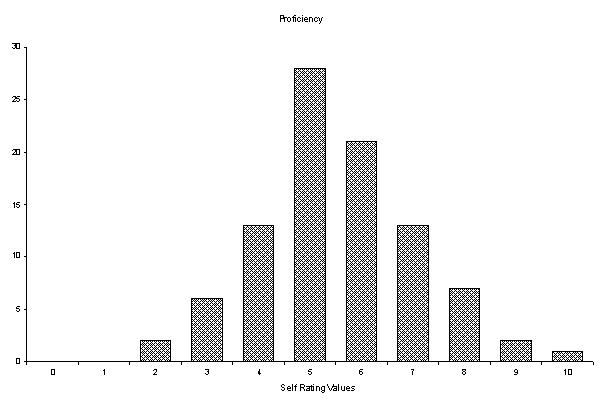
Students' perceptions of their English proficiency appeared to increase as they progressed through their studies, with significant differences between third and earlier years (p = .000). This result was confirmed by a further questionnaire item which asked students to evaluate the following statement from 1 (strongly agree) to 5 (strongly disagree):
The longer I study my subject, the more confident I become about the level of my English. (Question 5c)Again students responded slightly more positively with increasing years of study, although the overall mean of 2.8 did not differ significantly between different years.
Given the relatively substantial provision for language needs in tertiary institutions in Hong Kong, it is perhaps discouraging that students fail to perceive any substantial progress in their ability to tackle their academic subjects in English. This is particularly so, given that the largely monolingual life-world of the students provides only limited "incidental" exposure to English and that students appear to receive little language assistance from subject lecturers (responses to 5b above). These factors, together with the fairly high value that students seemed to place on the provision of EAP support, offer a case for providing English to students throughout their tertiary studies.
Turning to proficiency, the self-assessment data closely mirrored students' objective proficiency as measured by their Use of English grades, with all variations significant below p = .05 (Figure 4).
Figure 4 Confidence in English by Proficiency
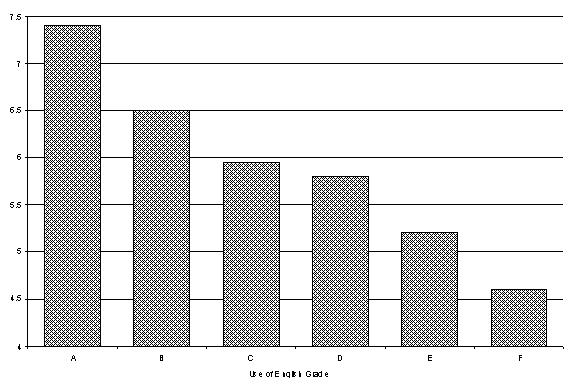
All proficiency levels felt that confidence improves with length of university study, with the strongest ratings given by A and F students. An English medium high school education also appears to give students significantly greater confidence (p = .000) in using the language. With regard to different disciplines of study, students of English-oriented subjects such as Communication and Translation assess themselves more highly than most other majors (p << .040) and were also more positive that length of study increased language confidence (p << .050). Science students, on the other hand, were the least optimistic about developing their proficiency (p << .002). Some students addressed this issue in the open-ended section, with increased confidence often attributed to the greater exposure to English and the need to use it more at university. A typical comment was:
Figure 5 Perceptions of Main Difficulties With English
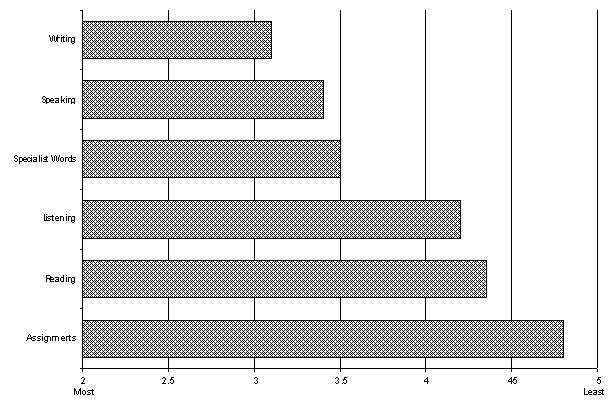
It is not surprising to find writing ranked first as this is frequently cited as the most important language skill for university success in Western contexts (Bloor & Bloor, 1991). Speaking is often considered relatively unimportant by lecturers (Littlewood & Liu, 1996), but its ranking as a major source of difficulty demonstrates its significance to students.
This may reflect the peculiarities of the Hong Kong context where students often have to interact orally in English in tutorials but find few other opportunities to converse in the language. The passive speech roles adopted by Hong Kong students, often noted in the literature (e.g., Flowerdew & Miller, 1995; Littlewood et al., 1996), contrasts markedly with the varied speaking activities frequently required in tertiary study (e.g., Ferris & Tagg, 1996). But while students apparently have a strong preference for interacting with one another in their mother tongue in class (Walters & Balla, 1992), many respondents expressed a need for speaking skills to perform in tutorials and relate to their foreign lecturers:
In addition, as a number of students observed, English is widely regarded as an important symbol of higher education in Hong Kong, although many are conscious of a failure to meet this standard:
The results also offer some support for Saville-Troike's (1984) claim that "vocabulary knowledge is the single most important area of second language competence" in academic achievement (p. 199). Subject lecturers have endorsed the need for vocabulary improvement among L2 students (Flowerdew & Miller, 1996; Santos, 1988), and a recent Hong Kong study shows that the early acquisition of a vast specialist lexis, about 2, 000 terms in the first semester, is the most important determining factor in the success of first-year medical students (Lucas et al., forthcoming). Students' perceptions of their obvious difficulties in this area therefore reflect the fact that undergraduates are forced to deal with a host of new terms, many of which have no Cantonese equivalent.
The relatively lower rankings that students give to difficulties with reading and listening may occur because the acquisition of subject knowledge urgently demands these skills. The need to process academic content almost exclusively in English is a compelling reason for quickly enhancing receptive proficiency. The apparent lack of anxiety by these students concerning their listening proficiency is not confirmed by the views of lecturers, however. Several Hong Kong studies have, in fact, commented on this weakness (Flowerdew & Miller, 1995, 1996; Allison & Tauroza, 1995). Despite this, students frequently mentioned their increased confidence in listening in the open-ended section:
Most year of study differences were not significant, although students appear to identify greater problems with writing as they proceed in their studies (p << .030). This may be because both the importance of writing (Johns, 1993) and the complexity of tasks (Bridgeman & Carlson, 1984) increase as students progress through their studies. It is also possible, however, that students develop an increased sensitivity to audience and generally become more aware of their limitations in written communication. On the other hand, students reported experiencing progressively less difficulty in interpreting assignments as they became more familiar with the norms of their subjects and grew more confident in dealing with their demands (p << .018).
The literature has identified disciplinary variations of academic tasks, particularly writing (e.g., Braine, 1995). Writing, however, was perceived as the most problematic aspect of English by all majors except Chinese (speaking) and Business Studies (vocabulary), both groups ranking writing in second place. Engineering students differed from all others by ranking listening second (p << .000) and by expressing relatively greater general confidence (p << .021), perhaps because Engineering faculties do not generally seem to require productive competence (Bridgeman & Carlson, 1984) and set written assignments only infrequently (Jenkins et al., 1993). Translation students differed significantly from all others in the low priority given to listening as a problem (p << .000) and in their emphasis on reading difficulties (p << .022).
While disciplinary variations were fairly uniform, proficiency comparisons exhibited considerable differences in how students perceived their language difficulties.
Figure 6 shows that both A and B students ranked specialist vocabulary as the most problematic aspect of English while other grades placed writing first with vocabulary (C & D) or speaking (E & F) second. There was little evidence to suggest that higher proficiency students were significantly more focused in their perception of their problems as standard deviations showed a minimal spread of responses between groups. Comparisons between these proficiency groups showed the most significant differences in listening (p << .003) and speaking (p << .034) with progressively less concern expressed by the more proficient students.
Figure 6 Problems with English Skills by Proficiency

It is harder to reach a good academic standard in my subject than to gain the necessary ability in English. (Question 4a)The first two questions may be paraphrased to mean that the specialist area causes more problems than English, while the third seeks to determine respondents' commitment to this statement.The difficulties I have reading academic books and articles are caused more by the nature of the subject than by the level of my English. (Question 4b)
If I succeed in my university studies I will succeed because my English has improved. (Question 4c)
The results are no more conclusive than those of earlier studies, however, with means clustering around the mid-point for each statement. But the results do, once again, emphasize that many students lack confidence in the adequacy of their language skills and suggest the need for continued and effective English support. Analysis showed clear group variations in these responses with students appearing to regard subject knowledge as increasingly important the longer they studied. Third-year students, for example, were more certain that reading difficulties were caused by subject comprehension (p << .050), and disagreement strengthened with the proposition that academic success would result from improved English (p << .003). Table 4 shows the means for each statement by year.
| Year | 4a | 4b | 4c |
|---|---|---|---|
| 1 2 3 | 2.94 2.89 2.81 | 2.78 2.69 2.50 | 2.83 2.99 3.11 |
Responses to the three statements also tended to reflect proficiency levels. As can be seen from Figure 7, higher ability students do seem more firmly convinced that specialist knowledge is a greater obstacle to academic success than English, although these views are not clear-cut. While only A grade students agreed firmly with 4a (p = .050), agreement with 4b was more pronounced and related to Use of English grades, with most inter-group differences significant below p = .050. Once again, trends were reversed with 4c, where agreement with the view that English is more important than subject knowledge increased with each downward step in ability grade (p << .050). This picture was confirmed by the school language of instruction data, where Chinese medium students were emphatic that improved English was the key to academic success (p = .004).
Figure 7 Relative Importance of English Ability and Subject Knowledge by Proficiency

Overall, weaker students seemed to feel that they needed to improve their English before they were able to make serious headway in their studies, although this may be true only in those disciplines where English plays a significant role. The information for subject majors tends to suggest, once again, a broad division between Arts and Science students regarding the relative importance of English and subject knowledge in achievement.
A subject lecturer ought to help students with his or her English (Question 5a)
| Year | 1 | 2 | 3 | overall |
|---|---|---|---|---|
| Mean | 2.6 | 2.42 | 2.86 | 2.57 |
All years differed significantly in their response to this question. As can be seen, second-year students demonstrated the strongest agreement (p << .001) and third-year students the weakest (p << .005). This is perhaps because second-year students often continue to experience serious problems with their studies as a result of continuing English deficiencies, even though the withdrawal of the language support they received as first-year students might be considered to indicate that they no longer need it. Hong Kong universities receive substantial funding for language enhancement, but this rarely extends beyond the first year of study. Subject tutors may therefore be the only sources of language assistance to which second- and third-year students have frequent access, although the extent to which they are competent or willing to do this remains an open question. The absence of language support appears to cause third-year students fewer concerns as they are likely to be more confident with their ability to work in English and more focused on discipline knowledge.
As might be expected, the desire for lecturer assistance with English increases with lower levels of language ability, with most differences significant (p << .050). Weaker students are often challenged by both their lack of competence in English and the demands of their subject and see their lecturers as the solution to both problems. Finally, disciplinary variations were considerable. Figure 8 shows that Science, Engineering, and Business Studies students were significantly less likely to see subject lecturers as a source of English assistance (all p << .030) while Language-based majors viewed this as a primary role (most differences p << .010).
Figure 8 Lectures and English Language Support by Discipline
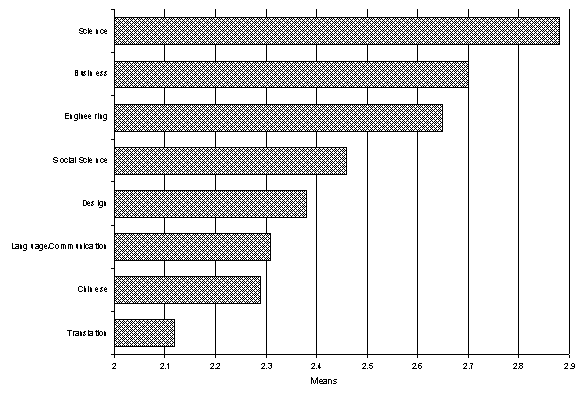
Related to this appreciation was a definite need to express ideas effectively:
A number of students also mentioned that university life required more intensive study methods and greater self-reliance, which placed extra demands on their English skills:
The difficulties of processing large amounts of English language input, both in lectures and books, are cited by students as major problems of university study. This concurs with Leki and Carson's (1994) finding that many students view developing their English competence as an efficiency issue: learning is driven by a need to increase their work rate by reducing the time spent in writing and comprehending in English.
It must be admitted, however, that not all Hong Kong students find this purely study-oriented approach in their English classes a facilitative factor. Some respondents believed their study of English had become too utilitarian and was no longer a means of creative communication.
Clearly, while EAP may be valued as important in their studies, we must guard against being too rigidly focused on academic goals so that students do not become alienated from their learning and lose their appreciation of English as a means of creative expression.
Like education in many other countries, tertiary study in Hong Kong confronts students with a more independent, active, and analytical approach to learning than they knew before. In Hong Kong, these challenges are compounded by the peculiar nature of its colonial education system, which imposes a second-language medium education on a largely monolingual society. Students are placed under a heavy burden by the need to study in a language to which their socio-cultural environment offers insufficient exposure and few opportunities to practice. The fact that many students struggle to master their subject disciplines with inadequate linguistic resources not only frustrates both students and lecturers, but also encourages learning strategies, such as classroom passivity, rote memorization, and copying from textbooks, which fuel this frustration.
Hong Kong learners are expected to bridge the gap between their Cantonese home-world and their English study-world with little difficulty, but the pressures of studying in English clearly weigh heavily on most of the respondents in this survey. In this situation, effective EAP support is all the more necessary, and while there are obvious implications for teaching here, the solution ultimately requires an appropriate institutional response. Students clearly require language support throughout their studies, and this should be a priority if English is to remain the principal language of tertiary instruction in Hong Kong beyond 1997.
Allison, D., & Tauroza, S. (1995). The effect of discourse organization on lecture comprehension. English for Specific Purposes, 14(2), 157-173.
Balla. J. (1991). A report of student attitudes to language and study at the City Polytechnic of Hong Kong. Hong Kong: Management Information Office, City Polytechnic of Hong Kong.
Bloor, M., & Bloor, T. (1991). Cultural expectations and socio-pragmatic failure in academic writing. In P. Adams, B. Heaton, & P. Howarth (Eds.), Socio-cultural issues in English for academic purposes (pp. 1-12). Basingsoke, UK: Modern English Teacher/British Council.
Bond, M., & Hewson, M. (1988). Social identity theory and the perception of intergroup relations in Hong Kong. International Journal of Intercultural Relations, 12, 153-170.
Braine, G. (1995). Writing in the natural sciences and engineering. In D. Belcher & G. Braine (Eds.), Academic writing in a second language: Essays on research and pedagogy (pp. 113-134). Norwood, New Jersey: Ablex.
Bridgeman, B., & Carlson, S. (1984). Survey of academic writing tasks. Written Communication, 1, 247-280.
Cheng, H., & Zi, R. (1987). In-house English language training: A survey of fifteen organisations. In R. Lord & H. N. Cheng, (Eds), Language education in Hong Kong (pp. 173-185). Hong Kong: The Chinese University Press.
Cheung, Y. (1985). Power, solidarity and luxury in Hong Kong: A sociolinguistic study. Anthropological Linguistics, 27, 190-203.
Cooley, L., & Lewkowicz, J. (1995). Quantum leap: From essay to thesis. In D. Nunan, V. Berry, & R. Berry (Eds.) Bringing about change in language education (pp. 210-216). Hong Kong, Hong Kong University Press.
Education Commission (1995). Report No 6. Hong Kong, Government Printer.
Ferris, D., & Tagg, T. (1996). Academic oral communication needs of EAP learners: What subject-matter instructors actually require. TESOL Quarterly, 30(1), 31-58.
Flowerdew, J., & Miller, L. (1996). Lecturer perceptions, problems and strategies in second language lectures. RELC Journal, 27(1), 23-46.
Flowerdew, J., & Miller, L. (1995). On the notion of culture in L2 lectures. TESOL Quarterly, 29(2), 345-373.
Fu, G. S. (1987). The Hong Kong Bilingual. In R. Lord & H. N. Cheng, (Eds), Language education in Hong Kong (pp. 27-50). Hong Kong: The Chinese University Press.
Giles, H., & Johnson, P. (1987). Ethnolinguistic identity theory: A social psychological approach to language maintenance. International Journal of the Sociology of Language, 68, 69-99.
Grundy, P. (1993). Student and supervisor perceptions of the role of English in academic success. Review of ELT, 3(1), 25-36.
Jenkins, S., Jordon, M., & Weiland, P. (1993). The role of writing in graduate engineering education: A survey of faculty beliefs and practices. English for Specific Purposes, 12, 51-67.
Johns, A. M. (1993). Written argumentation for real audiences: Suggestions for teacher research and classroom practice. TESOL Quarterly, 27(1), 75-90.
Kroll, B. (1979). A survey of writing needs of foreign and American college freshmen. ELT Journal, 33, 219-226.
Kwo, O. (1987). Bilingual secondary education in Hong Kong: What are the options? Working Papers in Linguistics and Language Teaching, 10, 1-10.
Leki, I., & Carson, J. (1994). Students' perceptions of EAP writing instruction and writing needs across the disciplines. TESOL Quarterly 28(1), 81-101.
Lin, A. M. Y. (1996). Bilingualism or linguistic segregation? Symbolic domination, resistance and code switching in Hong Kong schools. Linguistics and Education, 8, 49-84.
Littlewood, W., & Liu, N. F . (1996). Hong Kong students and their English. Hong Kong: Hong Kong University/ Macmillan.
Littlewood, W., Liu, N. F., Yu, C. (1996). Hong Kong tertiary students' attitudes and proficiency in spoken English. RELC Journal, 27(1), 70-88.
Lord, R., & Cheng, H. N. (Eds.). (1987). Language education in Hong Kong. Hong Kong: The Chinese University Press.
Lucas, P., Lenstrup, M., Printz, J., Wiliamson, D., Yip, H., & Tipoe, G. (forthcoming). Language as a barrier to the acquisition of anatomical knowledge by medical students in Hong Kong.
Richards, S. (1993). Motivation in second language learning: A Hong Kong perspective. Research Report 32. Hong Kong: Department of English, City Polytechnic of Hong Kong.
Santos, T. (1988). Professors' reactions to the academic writing of nonnative speaking students. TESOL Quarterly, 22, 69-90.
Saville-Troike, M. (1984). What really matters in second language learning for academic achievement? TESOL Quarterly, 18(2), 199-219.
So, D. (1989). Implementing mother tongue education amidst societal transition from diglossia to triglossia in Hong Kong. Language and Education, 3(1), 29-44.
Tung, P., Tsang, W. K., & Lam, R. (in press). English as a medium of instruction in post 1997 Hong Kong: What students, teachers and parents think. Journal of Pragmatics.
Walters, S., & Balla, J. (1992). English medium instruction at City Polytechnic of Hong Kong. Hong Kong: City Polytechnic of Hong Kong.
Yu, V., & Atkinson, P. A. (1988). An investigation of the language difficulties experienced by Hong Kong secondary school students in English medium schools: 1. The problems. Journal of Multilingual and Multicultural Development, 9(3), 267-84.
| 0 | 1 | 2 | 3 | 4 | 5 | 6 | 7 | 8 | 9 | 10 |
Ken Hyland is an associate professor at The City University of Hong Kong. He has a Ph.D. from the University of Queensland and has taught in Britain, Sudan, Saudi Arabia, Malaysia, Papua New Guinea, and New Zealand. His articles on language teaching, linguistic modality, and written discourse have appeared in several international journals.